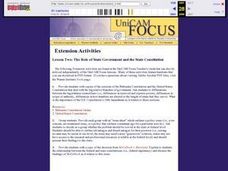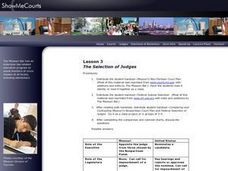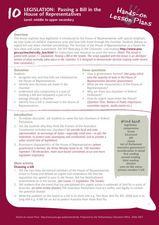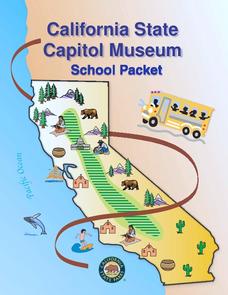Curated OER
President's Day
Students access prior knowledge about the branches of government to explore foreign policy. In this conflict resolution lesson plan, students reflect on foreign policy decisions and participate in scenarios based on foreign policy events.
Curated OER
Abraham Lincoln and Reconstruction
Students study Presidential Reconstruction during the Civil War years. They examine the role of the Executive Branch of government, especially in wartime. They investigate the complex issues of how Congress took on the role of...
Curated OER
Is Government Necessary?
Pupils investigate the purpose of Congress and determine how it affects them. They explain what life would be like without government.
Curated OER
Egyptian Fairy Tale
Students explore ancient Egyptian culture and government. For this social studies lesson plan, students compare the legal system from ancient Egypt to our current American legal system. Links are included for web searching Egypt and the...
Curated OER
The Role of State Government and the State Constitution
Learners examine sections of the Nebraska Constitution and the U.S. Constitution, and compare/contrast the two. They research policy issues, and decide whether they should be solved at the state or federal level.
Curated OER
Create Your Own Constitution
Eighth graders explore the processes, purpose and components of a good and just constitution. They focus on the Constitution of the United States of America. Students discuss the purpose of a constitution and reasons why the Constitution...
C-SPAN
Presidential Veto and Congressional Override
One of the key powers of the executive branch is the president's ability to pass or veto legislation proposed by Congress. Congress, the legislative branch, on the other hand, can override a president's veto. Five film clips show how the...
National Endowment for the Humanities
Lesson 4 James Madison: Internal Improvements Balancing Act—Federal/State and Executive/Legislative
Who has the power? The founding fathers asked the same question when the United States was formed. Learners explore issues that arose during Madison’s presidency that raised constitutional questions. Through discovery, discussion, and...
iCivics
Separation of Powers
In a fun and informative simulation, your learners will act in groups as lead chefs, menu writers, and nutrition inspectors in deciding a new school lunch menu. They will then compare and contrast their experience to the interaction...
C-SPAN
The Role of the Executive Branch in Policy Making
Although the president of the United States does not have the power to pass laws, they can propose legislation, veto bills passed by Congress, and issue executive orders that bypass Congress. Six video clips show middle schoolers these...
Curated OER
It's Your Right: A Civil Rights Brochure
Learners examine the US Constitution, Bill of Rights, and Supreme Court cases in order to broaden their understanding of the US Judicial System. They research a variety of textual and Internet resources to create a tri-fold brochure,...
Curated OER
American History Through the Len of the Supreme Court Decisions
Students examine the historical background of Supreme Court decisions and the basic principles behind legislation. As part of the lesson, students discover legal concepts and terms and write sentences using the vocabulary they have...
C-SPAN
Supreme Court Justices Research and Resumes
According to Article III, Section1 of the United States constitution, the only qualification one needs to be appointed to the Supreme Court is to demonstrate "good behavior." The president and Congress are given the power to determine...
Curated OER
The Selection of Judges
Students analyze documents to determine the steps taken in the selection of judges.
Curated OER
Legislation: Passing a Bill in the House of Representatives
Students study the concept of legislation as it relates to passing a bill in the House of Representatives. In this legislation: passing a bill in the house of representative lesson plan, students identify why and how bills are introduced...
California State Parks
California State Capitol Museum School Packet
Here is great packet of worksheets to introduce your young learners to the general history of California and basic facts about the Golden State. Topics covered range from state counties, Sacramento, and the capitol to the...
K12 Reader
Three Levels of Government
Help your learners work their way through a reading assignment for informational text. Using context clues, they answer five comprehension question based on a short passage about the three levels of government: local government, state...
C-SPAN
Choice Board: Expressed and Implied Powers
Article 1, Section 8 of the United States Constitution expressly lists powers given to Congress. Over the years, lawmakers have expanded the enumerated powers to include powers implied by the list. To better understand the significance...
PBS
Reading Adventure Pack: Government
A reading adventure pack looks closely at government with the help of two books—one fiction, one nonfiction, and a series of activities. Learners craft a mobile to visualize a balanced government, participate in a scavenger hunt around...
C-SPAN
How A Bill Becomes A Law
Seven steps are required for a bill to become a United States law. The Families First Coronavirus Response Act (H.R. 6201) is used as a model for the process of how a bill becomes a law. Class members work independently through a Google...
Carolina K-12
Principles of the US Constitution
After breaking into groups according to major principles of government (i.e., popular sovereignty, separation of powers, checks and balances, etc.) in the United States, your class members will produce public service announcements...
Curated OER
Same-Sex Marriage Legalized in New York
Same-sex marriage is the hot topic discussed in this New York Times article. Upper graders read the article and then answer eight comprehension questions. Note: This article is more about the Senate and legislation than about same-sex...
C-SPAN
14th Amendment Equal Protection Clause
Two Supreme Court cases, Plessy v. Ferguson and Brown v. Board of Education take center stage in a instructional activity about the Equal Protection Clause of the 14th Amendment. Class members research both cases to compare and contrast...
C-SPAN
Judicial Review and Marbury v Madison
The Supreme Court case Marbury v. Madison may not be widely recognized but the landmark case is particularly significant because it established the precedent for judicial review and that the Supreme Court had power as an interpreter of...
Other popular searches
- Three Branches of Government
- 3 Branches of Government
- Branches of Government Chart
- U.s. Branches of Government
- The Branches of Government
- U.s. Government (Branches)
- Us Government Branches
- Federal Government Branches
- Government Branches
- State Branches of Government
- Canadian Government Branches
- National Government Branches

























